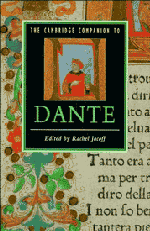Book contents
- Frontmatter
- 1 Life of Dante
- 2 Dante and the lyric past
- 3 Approaching the Vita nuova
- 4 The unfinished author
- 5 Dante and the empire
- 6 Dante and Florence
- 7 Dante and the classical poets
- 8 Dante and the Bible
- 9 The theology of Dante
- 10 A poetics of chaos and harmony
- 11 Introduction to Inferno
- 12 Introduction to Purgatorio
- 13 "Shadowy prefaces"
- 14 Dante and his commentators
- 15 Dante in English
- Further reading
- Index
6 - Dante and Florence
Published online by Cambridge University Press: 28 May 2006
- Frontmatter
- 1 Life of Dante
- 2 Dante and the lyric past
- 3 Approaching the Vita nuova
- 4 The unfinished author
- 5 Dante and the empire
- 6 Dante and Florence
- 7 Dante and the classical poets
- 8 Dante and the Bible
- 9 The theology of Dante
- 10 A poetics of chaos and harmony
- 11 Introduction to Inferno
- 12 Introduction to Purgatorio
- 13 "Shadowy prefaces"
- 14 Dante and his commentators
- 15 Dante in English
- Further reading
- Index
Summary
DANTE'S ANGRY denunciation of Florence and the Florentines is one of the memorable themes of the Divina Commedia. Repeatedly in the great poem, and in several of his letters, Dante excoriated the Florentines for the violence, factionalism, and instability of their politics, for their excessive pursuit and consumption of wealth, and, worst of all, for their criminal resistance to what he considered the divinely ordained authority of the Roman emperor. Because we know so little of Dante's political views and opinions about Florence before his exile in 1302, it is tempting to use the fact of the exile and Dante's emotional reaction to it as a way of explaining his harsh critique of his own city. While there is no doubt much truth in such an approach, it is equally important to grasp the influence on Dante of the traditions of political and historical thought that emerged in Florence during the course of the thirteenth century, and in particular of the ideas associated with movements of popular opposition to the traditional dominance of the elite of upper-class families.
- Type
- Chapter
- Information
- The Cambridge Companion to Dante , pp. 80 - 99Publisher: Cambridge University PressPrint publication year: 1993
- 3
- Cited by

